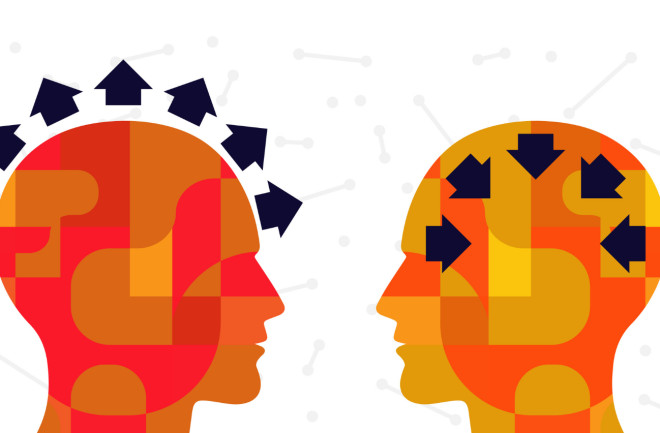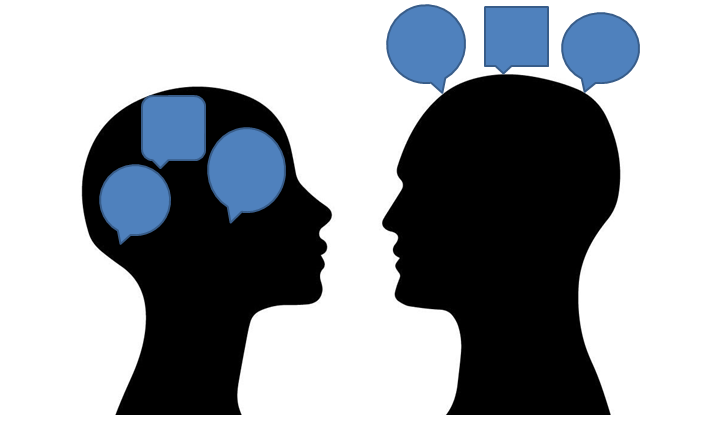The five-factor personality model, which includes the degree of extraversion (also known as extroversion) as one of its factors, is widely accepted by modern psychologists.
Extroverts are satisfied by interaction with others and the outside world, whereas introverts are energized by their own inner thoughts and feelings. As ambiverts, these people can be either introverted introverts or introverted extroverts depending on their primary trait. However, many people fall somewhere along the continuum between introversion and extroversion.
So, what is an introverted extrovert?
Introverted extroverts are people who are full of energy when around people, but start to burn out when around people for too long and still crave alone time to recharge, just like introverts.
For more information, continue reading.
Table of Contents
What Is An Extroverted Introvert?
The introverted extrovert is a subtype of ambivert that has its roots in the extrovert side of the spectrum but combines the personality traits of both an extrovert and an introvert. An introverted extrovert is someone who, like an introvert, gets energy from being around people but can start to feel depleted when around them for too long. They still yearn for alone time to refuel.
Though personalities develop early on, different life experiences can change who you are. As a result, if you identify as an introverted extrovert, you probably have an introverted personality at heart but can become outgoing depending on the situation.
An Introverted Extrovert Signs
Here are a few signs that you might be an introverted extrovert:
You Host Then Ghost
An event such as a party, a work function, or a social gathering can require all of an introverted extrovert’s extroverted energy, and afterward, they may require deep sleep to recover. Cynthia M.A. Siadat, LCSW, has seen in her practice that introverted extroverts “are friendly and solid conversationalists but seem to disappear from their friends’ radar from time to time.”
Like To Be Around People Sometimes And Be Alone Other Times
Certain aspects of the introverted-extroverted personality traits can be highlighted by context. You might be called to spend more time alone reflecting if you’re going through a difficult time in life. When things are going well for you and you feel successful, you might be moved to spread this enthusiasm to other people. Also take into account the other letters in your Myers-Briggs-Type Indicator (MBTI) type, such as the S for Sensing or the N for Intuition. These show how you interact with your surroundings.
You Are A Charismatic Leader Who Avoids The Spotlight
The introverted extrovert can work well with others and lead teams in leadership roles, but when recognized for their accomplishments, they may divert attention away from themselves and back onto their team. For instance, after receiving an award at work, you might immediately focus on your team and occasionally minimize your own contribution.
Have Meaningful Conversations In Person But Don’t Answer Texts Or Emails
When they are present, introverted extroverts have deep conversations and give their loved ones their undivided attention, but they are difficult to get on the phone. You might really enjoy someone’s company while eating, but you might need some time alone afterward, away from your phone, to recharge.
Although You Enjoy Helping Others, It Is Difficult To Accept Assistance For Yourself
Siadat claims that although her clients are introverted extroverts, they have trouble receiving the same level of care that they give to others. This may appear as giving assistance to those in need while rejecting assistance from others. See more about What Is A Coordinator?
Thrive As An Introverted Extrovert
Be Tolerant Of Your Complexity
In the 1920s, psychologist Carl Jung first used the terms introversion and extroversion to describe how individuals consistently react to their surroundings. Jung claimed at the time that the extrovert personality was preferable, and this idea has persisted in our popular culture.
However, there is no need to be afraid of being an introvert in any capacity. A 2017 paper published in the Journal of the History of the Behavioral Sciences emphasizes that personality traits do not measure your social capacities and instead point to how a person needs to recharge and re-energize. Try not to feel guilty if you start to feel exhausted while having fun with 100 other people at your friend’s birthday party. It’s just a signal that you need to work on your introversion. It’s possible that your body is urging you to rest at home.
Learn How You React In Various Settings
It’s crucial for you to remain in tune with your needs as an introverted extrovert because the energy oscillation between introvert and extrovert energy can seem extreme to people on the outside. Immersing yourself in various environments while getting really good at figuring out what gives you energy and why is a good learning experiment. Does your significant other encourage your silly extroversion? Do you find silence in your meditation class to be reviving? You can gain a deeper understanding of who you are by becoming aware of how you react in various situations.
Makes Use Of Both Your Introverted And Extroverted Strengths
The ability to connect with more people is a huge benefit of being an introverted extrovert. As a result, more of the world will become accessible to you. Organizing psychologist Adam Grant, Ph.D., conducted a study in 2013., highlights the benefits of being an ambivert like an introverted extrovert. You can relate to more people because you can draw on both types of personalities. Grant studied salespeople who identified as ambiverts and found “they naturally engage in a flexible pattern of talking and listening.” For example, “Ambiverts are more likely to listen to their customers’ interests and are less likely to come off as overly enthusiastic or confident, but they are still likely to express enough assertiveness and enthusiasm to persuade and close a sale.” Everyone involved will benefit if you can find a job that makes use of your introverted and extroverted traits.
Be Willing To Change
Over the course of a lifetime, personality traits can change. “You’ll want to be careful to avoid comparing yourself to others or former versions of yourself,” Siadat notes. “You might hear phrases like “Well, I used to be SO social.’ While that may have been true in the past, you are a completely different person now than you were a year ago thanks to your new knowledge and experiences.”
Recognizing that change is uncomfortable can cause some resistance. You can, however, live more authentically by remaining in the present and connecting with who you are right now.
Get Better At Expressing Your Needs
Personality traits like introversion and extroversion can show you where you need to refuel. You will benefit, as well as those around you, if you can recognize what you need to stay balanced and express that need. “People who [are] introverted also need to be very much aware of protecting themselves against overstimulation and burnout,” Page says.
Decide Which People Give You A Boost
Some people match your energy needs better whether they are around in person or virtually. You may discover that some people drain your energy while others rekindle it once you become aware of your energy levels. “Loved ones come in all shapes and sizes with varying levels of emotional safety,” says Siadat. “They don’t necessarily have access to you just because you or they love you.” Extroverted introverts should be careful about who they invest their energy.
The Expert On You Is You
You are the expert of you because your inner experience forms the foundation of who you are. The only person who truly understands what is best for you and your inner world is you. You can conduct research and learn from behavioral science and psychology experts.

The Challenges Of Being An Extroverted Introvert
As opposed to more extreme personalities, ambiverts can have advantages, but they also face challenges. To choose which aspect of their personality to display in a given circumstance, they must be self-aware. They must also learn not to push themselves to act in ways that they feel more like introverts or extroverts, as doing so could emotionally drain them.
The difficulty that some people have reading ambiverts is another difficulty they encounter. For instance, a coworker might be surprised to learn that the outgoing person they met at work frequently prefers to spend quiet evenings with just one or two friends.
As a result, it’s crucial for ambiverts to understand when they are feeling more introverted or extroverted and to know when to set boundaries with people who try to force them to act in a certain way. More people should be able to identify ambiversion’s characteristics—in both themselves and others—as awareness of the condition grows.
What Is An Ambivert?
Ambiverts include both extroverted introverts and introverted extroverts. Depending on the circumstances, they might prefer to spend an evening alone or be the life of the party. When the situation demands it, they can be reserved, and when an outgoing demeanor is more appropriate, they can be gregarious.
The Origins Of Ambiversion
The terms extroversion and introversion became widely known in the 1920s thanks to Swiss psychiatrist Carl Jung. He discovered a different group of people while researching personality types. These people were hard to categorize as extroverts or introverts.
Arguing that there is no such thing as a pure extrovert or introvert, he said, “There are some reasonably well-balanced people who are just as much or just as little influenced from within as they are from without.”
Even though psychologists have been using the term “ambivert” since the 1940s, most people have never heard of it. The 21st century has seen a significant increase in interest in ambiversion due to well-liked YouTube videos, TEDx talks, and books about the personality type.
Additionally, more people are becoming aware that they are neither introverts nor extroverts, which is another factor contributing to the increased attention given to ambiversion.
The prefix ambi means “both,” and vert means “to turn.” Introverts move inward, whereas extroverts move outward. Depending on the circumstance, ambiverts may take an inward or an outward turn.
How Frequently Occurs This Personality Type?
According to Adam M. Grant, a psychology professor at the Wharton School of the University of Pennsylvania, two-thirds of people do not identify as extroverts or introverts. According to his estimation, ambiverts make up more than half of the population.
Personality types aren’t things that people consciously choose to be. Instead, personality begins to form as early as infancy and does not significantly change as we age. That’s because personality type is influenced by both environment and genetics, with extraversion being connected to dopamine levels in the brain.
Dopamine, a neurotransmitter, affects the brain circuits that “control reward, learning and responses to novelty,” according to a study by lead researcher According to Michael Cohen’s research, extroverts’ brains are more sensitive to risky activities like gambling.
What Is Dopamine?
Dopamine and personality have also been linked in other studies, particularly in terms of how much people enjoy novel and unfamiliar experiences. But introverts’ brains have fewer dopamine receptors than extroverts’. Again, ambiverts fall somewhere in the middle; they have a higher dopamine threshold than introverts but a lower threshold than extroverts.
The behavior of ambiverts is not entirely dominated by either introversion or extroversion. They won’t likely be overstimulated by a night on the town, but they also won’t likely be bored by a night at home reading a book.
Although they have aspects of both, they are neither wallflowers nor party animals. Ambiverts are thought to have some advantages over introverts and extroverts because, overall, they have well-balanced personalities.
The Benefits Of Ambiversion
Extroverts have long been believed to have the people skills, charisma, and showmanship required to move up the corporate ladder, but research suggests that ambiverts might succeed in their careers more. Grant’s research on the topic indicates that it’s not extroverts who excel as salespeople, but ambiverts.1
He administered a personality test to 340 call center workers and discovered that ambiverts sold 51% more goods per hour than the typical salesperson. Because their personality test results were balanced between introversion and extroversion, he classified these employees as ambiverts.
Therefore, why did ambiverts succeed so well? They are adaptable due to their personality traits; they know when to be gregarious and when to tone it down. This contrasts with introverts who might be too reserved to reveal much about themselves to clients, and extroverts who might not know when to rein in their outgoing personalities.
This social adaptability enables ambiverts to connect with a wide range of people, some of whom may be turned off by overly enthusiastic and chatty salespeople and others who may be more likely to buy from a friendly salesperson.
Conclusion
There is a continuum of extroversion. There aren’t many, if any, individuals who are only introverts or only extroverts. On this line, people choose to sit.
Many of us display a variety of traits, some of which are indicative of extroversion and others of which are indicative of introversion. You might identify as an introverted extrovert or vice versa. Many people who lack extroversion have developed techniques for acting extroverted (or “faking it”) when the situation calls for it.
Many thanks for reading.



